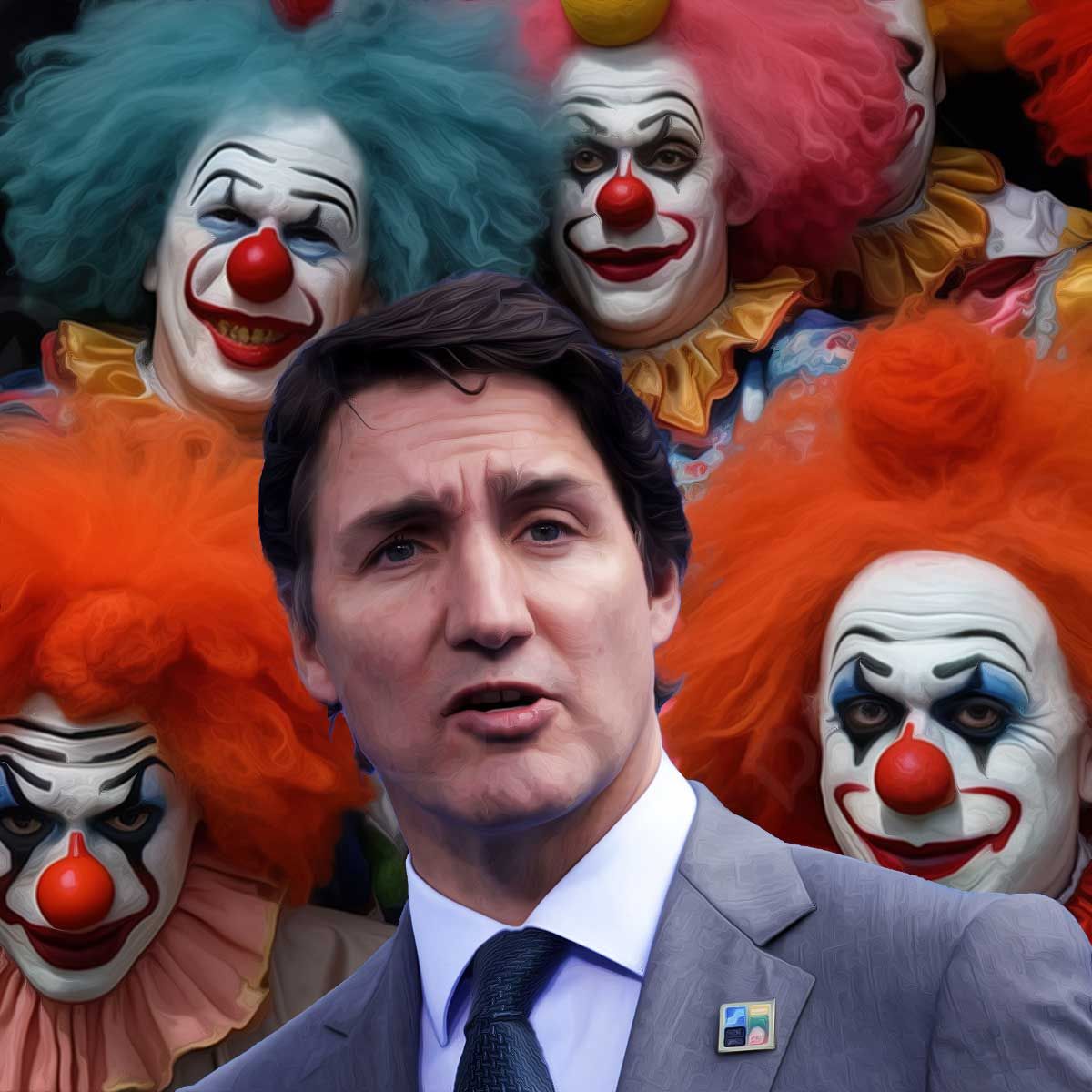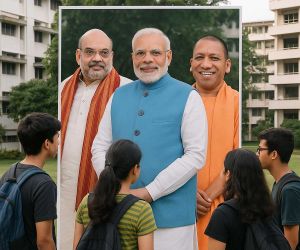MORE COVERAGE
Twitter Coverage
Satyaagrah
Written on
Satyaagrah
Written on
Satyaagrah
Written on
Satyaagrah
Written on
Satyaagrah
Written on
JOIN SATYAAGRAH SOCIAL MEDIA
"Trudeau's lone crusade: Allies turn a deaf ear": Amid a diplomatic row over Nijjar's murder, Trudeau aims to avoid escalation as global allies stay reticent, India expels a Canadian diplomat, further issuing a advisory for its nationals in Canada

In an escalated response to the mounting diplomatic tension between India and Canada, the Indian government has issued a stern advisory to its nationals and students residing in Canada. This urgent message comes as a cautionary measure, advising them to "exercise utmost caution," citing the rising tide of "anti-India activities and politically-condoned hate crimes and violence in Canada."
|
This advisory emerged a day following a similar advisory issued by the Canadian government, which cautioned its citizens in India in the midst of the ongoing clash between the two countries regarding the alleged assassination of Khalistani extremist Hardeep Singh Nijjar. At the epicenter of this turmoil is Canadian Prime Minister Justin Trudeau, who vociferously alleged the "potential" role of Indian agents in the aforementioned killing, stirring a hornet's nest in the diplomatic corridors.
The notice was shared with the masses by Arindam Bagchi, the spokesperson for the Ministry of External Affairs, on X (formerly Twitter). He quoted the advisory, which stressed on the precautionary measures that Indian nationals should adopt due to the "growing anti-India activities and politically-condoned hate crimes and criminal violence in Canada." It further noted the increased likelihood of threats being posed to Indian diplomats and sections of the Indian community opposing the anti-India narrative in Canada, urging individuals to steer clear of potentially volatile regions and venues in Canada that have witnessed such untoward incidents.
In a comforting move amidst the brewing storm, the government affirmed its dedication to safeguarding the well-being of the Indian diaspora in Canada, maintaining constant communication with the Canadian authorities via the High Commission and Consulates General.
|
The advisory, highlighting the "deteriorating security environment in Canada," underscored the need for Indian students in Canada to remain extremely cautious and vigilant during these troubled times. Moreover, it urged Indians and Indian students to register with the respective Indian diplomatic offices through specified portals to facilitate swift assistance in case of emergencies or unfavorable incidents.
Adding another layer to the already tense relations, India had previously expelled a senior Canadian diplomat, mirroring Ottawa's actions of expelling an Indian official amid this crisis, thereby straining the bilateral ties further. As the diplomatic spat intensified, External Affairs Minister S Jaishankar conferred with Prime Minister Narendra Modi in the newly erected parliament building, briefing him on the evolving situation.
With this development, it remains to be seen how the narrative between the two nations will unfold, as both nations stand on the precipice of a deepening diplomatic rift. The hope remains that the ongoing dialogue and interventions will forge a path of understanding and resolution, steering away from further escalation.
‘We are not looking to provoke or escalate’: Trudeau says over terrorist Nijjar’s murder after triggering a massive diplomatic fallout with India
In an apparent backtrack on the brewing diplomatic debacle, Canadian Prime Minister Justin Trudeau seemed to modulate his previously staunch anti-India stance regarding the murder of Khalistani terrorist Hardeep Singh Nijjar on Canadian grounds. On the 19th of September, local time, Trudeau attempted to calm the raging diplomatic storm, emphasizing that Canada had no intentions to ‘provoke or escalate’ the situation with the Indian government.
In an interaction with Reuters, Trudeau called for serious attention from the Indian government towards this matter, indicating that his government was merely portraying the facts as perceived by them. Emphasizing the gravity of the situation and its implications on international law, he asserted, "It is extremely serious, and it has far-reaching consequences in international law… We’re going to remain calm. We are going to remain grounded in our democratic principles and values. We are going to follow the evidence and make sure the work is done to a whole people."
|
This statement came shortly after it became evident that Trudeau found himself isolated in his accusations against India, with none of the Western allies, including the members of the close-knit Five Eyes intelligence alliance, extending their support to Canada’s stance. This shift in tone emerged hours after several media reports highlighted the reluctance of the United States, the United Kingdom, and Australia to issue a united statement condemning India.
Media outlets, including The Washington Post, reported the Western allies' persistent refusal to be enmeshed in Trudeau's narrative of “foreign interference”, debunking the perceived solidity of his allegations against India. These reports divulged Trudeau's weeks-long endeavor to garner support from allied nations for his anti-India rhetoric, a mission that has seemingly hit a brick wall. Trudeau had, reportedly, reached out to these nations, urging them to unify in their stance and issue a collective statement denouncing the killing of Nijjar as a breach of international norms.
Now, with a visibly moderated tone, Trudeau appears to be extending an olive branch, signalling a willingness to collaborate with the Indian government to resolve the issue amicably. It remains to be seen whether this adjustment in stance will pave the way for diplomatic discourse and potential resolution, or if it marks the onset of a deeper, more convoluted diplomatic row between Canada and India.
As reported by The Washington Post, the ongoing controversy over the death of Khalistani terrorist Hardeep Singh Nijjar has seen Canada fervently encouraging its closest allies, members of the esteemed Five Eyes intelligence-sharing network, to take a united stand against India. Canada has been pressing these nations to address the matter at the highest government echelons and issue a collective statement denouncing the incident as a violation of international standards, mentioned a Western official, choosing to remain anonymous due to the delicacy of diplomatic relations.
|
However, Trudeau's fervent appeals have met with staunch refusal from Canada's Western allies, including the United States. These nations have decidedly sidestepped Trudeau's request, leaving him to pursue his allegations solitarily. Consequently, Trudeau, amidst the backdrop of an unfruitful visit to India, brought forth these allegations singularly in the Parliament on the 18th of September.
In a peculiar turn of events, while Trudeau asserts that Canada harbors no intentions to "provoke or escalate" the Government of India, there have been media buzzes suggesting the release of a new travel advisory by Canada. This advisory purportedly cautions Canadians to be highly vigilant while travelling to India, given the current diplomatic strain between the two nations. Nonetheless, a verification conducted by OpIndia revealed that these media reports may be misleading. A scrutiny of the past advisories issued by Canada regarding travel to India disclosed that the advisory content remained largely unchanged, barring minor alterations. Therefore, it could be concluded that the supposedly 'new' advisory doesn't directly stem from the recent diplomatic friction between Canada and India.
This scenario not only paints a picture of a diplomatically isolated Canada but also showcases the potential misinformation permeating through the media regarding the diplomatic ties between India and Canada. It places a magnifying glass on the turbulent relationship, raising questions about the veracity of Trudeau's claims and the media narratives surrounding this contentious issue.
|
Canada under Scrutiny: Trudeau Accuses India Unfoundedly, Straining Diplomatic Relations
In an unforeseen development on the 18th of September, Canadian Prime Minister Justin Trudeau took the global stage to indict India for the death of Khalistani extremist Hardeep Singh Nijjar on Canadian soil, a move that has garnered widespread attention and critical scrutiny. This accusation, presented without any substantiated evidence, has been unequivocally repudiated by the Indian government, who urged Canada to clamp down on the anti-India factions festering within its borders.
In the unfolding scenario, the Canadian Foreign Minister, Mélanie Joly, divulged that a senior Indian diplomat was expelled in the aftermath of Trudeau's claims, further straining the already fragile diplomatic relations between the two nations. The Indian government vehemently rejected Trudeau's allegations, emphasizing the necessity for Canada to take stringent measures against anti-India entities operating within their territory.
For decades, the alleged sheltering of Khalistani terrorists in Canada has been a persistent point of contention hindering the amicable relations between India and Canada. Notably, the Canadian government had previously permitted the notorious terrorist Talwinder Parmar to function freely within their borders during the 1980s. This was in spite of an existing extradition request from India, accompanied by compelling evidence highlighting Parmar's involvement in orchestrating a bomb blast.
This alarming tendency has not ceased, with numerous Khalistani separatists continuing to reside and orchestrate their operations in Canada, posing a significant threat to India and its diplomats stationed there. Despite consistent appeals from India over the years, the Canadian administration seems to persist in backing these entities, facilitating the perpetuation of their anti-India activities from Canadian territory.
|
This latest development marks a significant low in the Indo-Canadian relationship, underscoring a longstanding issue that has vexed diplomatic relations for years. Trudeau's recent accusations, devoid of any solid proof, have only exacerbated the situation, raising concerns over the future of diplomatic relations between the two nations.
As the diplomatic row deepens, with advisories and expulsions marking a significant strain in relations, the world watches keenly. The underlying concern here is the apparent discord between what Trudeau professes publicly and the actions that are being taken within his government. This series of events has unfolded a narrative where Trudeau seems to stand isolated, with even close allies reluctant to support his allegations against India.
In conclusion, the unfolding events paint a precarious picture for Indo-Canadian relations, with baseless allegations and counteractive measures highlighting a significant rupture in diplomatic ties. As the narrative develops, it is essential to tread with caution, discerning fact from fiction, and hoping that diplomacy prevails over discord in the coming days.
 Support Us
Support Us
Satyagraha was born from the heart of our land, with an undying aim to unveil the true essence of Bharat. It seeks to illuminate the hidden tales of our valiant freedom fighters and the rich chronicles that haven't yet sung their complete melody in the mainstream.
While platforms like NDTV and 'The Wire' effortlessly garner funds under the banner of safeguarding democracy, we at Satyagraha walk a different path. Our strength and resonance come from you. In this journey to weave a stronger Bharat, every little contribution amplifies our voice. Let's come together, contribute as you can, and champion the true spirit of our nation.
 |  |  |
| ICICI Bank of Satyaagrah | Razorpay Bank of Satyaagrah | PayPal Bank of Satyaagrah - For International Payments |
If all above doesn't work, then try the LINK below:
Please share the article on other platforms
DISCLAIMER: The author is solely responsible for the views expressed in this article. The author carries the responsibility for citing and/or licensing of images utilized within the text. The website also frequently uses non-commercial images for representational purposes only in line with the article. We are not responsible for the authenticity of such images. If some images have a copyright issue, we request the person/entity to contact us at This email address is being protected from spambots. You need JavaScript enabled to view it. and we will take the necessary actions to resolve the issue.
Related Articles
- "A one-man global protest": Trudeau fails in rallying allies against Modi Govt over Khalistani support; Five Eyes nations prioritize relations with India, dismissing his claims and continuing strategic partnerships, signaling 'move on' diplomatically
- "All the allegations against the government of Gujarat were fake and fabricated", Amit Shah busted ideologically aligned journalists for making the 2002 Gujarat riots worse, here is how they impacted the entire media narrative
- "Charting history, one decision at a time": In a bold move, Modi Govt issues final notice to Delhi Waqf Board over 123 assets, encompassing Central Delhi's iconic Jama Masjid, AAP MLA & Waqf Board Chairman, Amanatullah Khan voices strong dissent
- "Things gained through unjust fraud are never secure": Sahara Refund Portal - Amit Shah launches a game-changing initiative to help depositors reclaim their money from Sahara Group's cooperative societies, the initial phase will disburse up to ₹5000 cr
- "No amount of evidence will ever persuade an idiot": US spokesperson rebuffed Paki Journalist talking about BBC documentary, stated unfamiliar with documentary, but is familiar with vibrant democracy of India, and both US & India shared democratic values
- 9 Indian Mujahideen operatives convicted by NIA Court for bombing Narendra Modi’s Patna rally in 2013
- From the release of all political prisoners from jails to asking India to quit the World Trade Organization are the bizarre demands of BKU (Dakaunda) - Holds massive rally, says will ask questions of Congress and AAP too
- "Cheers to bloopers, Canadian hoppers": Canada's shocking applause for WWII veteran Hunka, an ex-Nazi SS member, brings to light a disturbing pattern of harboring war criminals, amidst international outrage, the nation grapples with its unsettling past
- At Canada’s Khalsa Day Parade, terrorist Santokh Singh Khela stood with Pierre Poilievre as “Kill Modi” chants rang out, Khalistani flags waved, Nijjar was glorified, and SFJ terrorists pushed their anti-India agenda with jailed Modi cutouts on display
- "At the helm of a new world narrative": Jaishankar articulates the distinct strides New Bharat has made on the G20 stage, heralding an era of enhanced diplomatic relations & global responsibilities, "It is a different world, different India, different PM"
- Rise of Shiv Shahi
- "आइस-पाईस": Canadian police admits it's a safe haven for Khalistanis, blaming the Lawrence Bishnoi gang for violence, Trudeau accuses India of Nijjar's murder, while WaPo targets Amit Shah, both nations expel diplomats in a growing political standoff
- ″‘I’ll miss you,’ she said with a tear in her eye. Then she gave me a kiss and whispered, ‘Goodbye’": Heeraben Modi merged in Panchtatva who passed away today at the age of 100 in Gandhinagar, PM Narendra Modi - ‘In Maa, I have always felt that Trimurti’
- "UPI payments at Eiffel Tower": Under PM Modi's leadership, India-France ties have surged, encompassing extended student visas, UPI introduction in France, and heightened diplomatic presence symbolizing a new era of prosperous outcomes for both nations
- "Face the future, say 'bring it on'": NIA lists 43 top criminals, including Canada-based with Khalistani ties, as tensions rise, Trudeau implicates India in Nijjar's Canada murder; India promptly refutes, calling the accusation 'absurd and motivated'

























